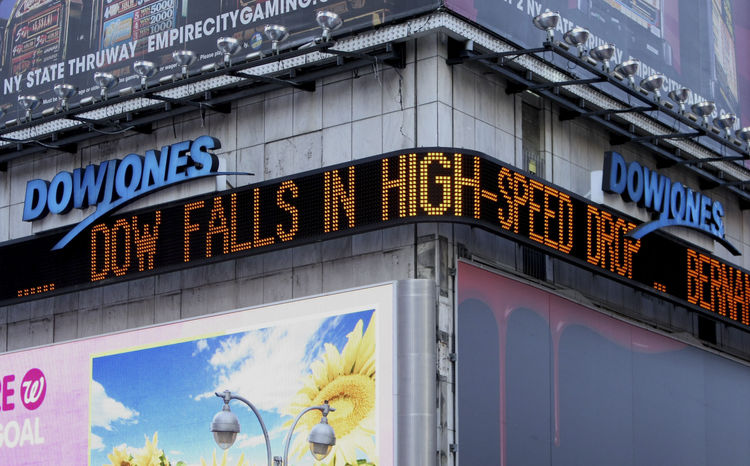Economy
Dow Sinks 390 Points in Global Selloff
Published
9 years agoon

Stocks tumbled around the world, with U.S. equities sinking to their lowest levels since August, and bonds and gold jumped as oil’s plunge below $30 sent markets reeling. Treasuries extended gains as economic data and earnings added to concern that global growth is faltering.
The Dow Jones Industrial Average sank 391 points, European stocks fell into a bear market and the Shanghai Composite Index wiped out gains from an unprecedented state-rescue campaign as global equities added to the worst start to a year on record. Oil touched $29.28 a barrel before closing at a 12-year low. A measure of default risk for junk-rated U.S. companies surged to the highest in three years. Yields on 10-year Treasury notes dipped under 2 percent as doubts grow that the Federal Reserve will raise interest rates. Gold surged the most in six weeks.
Crude’s drop to a 12-year low is sending shock waves around the world at the same time concern is mounting that China’s policy interventions will fall short of stoking growth in the world’s second-largest economy. Figures on retail sales and manufacturing Friday showed the U.S. economy ended the year on a weak note, and the start of 2016 wasn’t any better. Energy firms are laying off workers and currency markets from commodity-producing countries are in turmoil. The slump is also denting the outlook for inflation, causing traders to curb bets on how far the Fed will raise rates this year.
“Markets have to go through several stages and right now they’re just holding their head and crying,” Krishna Memani, chief investment officer at Oppenheimer Funds Inc. in New York, said by phone. “The drama and issue overnight is more related to oil prices not finding a floor. If it was just China and everything else was OK, we’d see through that. But when China is down and oil drops everyday, the market recognizes it has substantial issues.”
Adding to the unease, Intel Corp. dropped 9 percent after predicting first-quarter sales that fell short of some estimates. The semiconductor maker’s note of caution came at the start of an earnings season that may see U.S. profits fall faster than any time since the financial crisis.
Stocks
The Standard & Poor’s 500 Index plunged 2.2 percent at 4 p.m. in New York. The index fell as much as 3.3 percent before paring the slide in afternoon trading. It still capped a third weekly retreat and closed at the lowest level since Aug. 25, the day that marked the bottom of the summer selloff. U.S. equities markets are closed Monday for a federal holiday.
The gauge has lost 12 percent from its May record, leaving it well short of sliding into a bear market. It capped a third weekly decline, the longest slide since July. The Dow tumbled 2.463 points as none of its 30 members advanced, while small caps added to a bear market.
“There’s more uncertainty out of China, more uncertainty out of the Fed and then you have uncertainty about where the bottom is in oil prices. Markets abhor uncertainty,” said Quincy Krosby, a market strategist at Prudential Financial Inc., which oversees about $1.2 trillion. “The package of economic data this week certainly questions whether or not we are going to pull out of this. This is a lot deeper than what you’d see normally on a three-day weekend.”
Weakness in retail sales compounds concerns that momentum in consumer spending, which has been the backstop of U.S. growth prospects, is starting to fade. Meanwhile, a slowdown in China and other emerging markets has sent commodity prices lower and roiled stock markets around the world, exacerbating the plight of manufacturers who are being hit by an appreciating dollar.
The Stoxx Europe 600 Index retreated 2.8 percent, capping a weekly drop of 3.4 percent. Europe’s benchmark closed more than 20 percent from its record in April — meeting the common definition of a bear market.
Commodities
West Texas Intermediate crude fell as much as 6.2 percent, before settling 5.7 percent lower at $29.42 a barrel. Brent fell 5.9 percent to $29.05 a barrel. The discount on global benchmark Brent reached a five-year high as Iran moved closer to restoring exports.
While WTI sank 11 percent for the week, Goldman Sachs Group Inc. says crude will turn into a new bull market before the year is out as the price rout shuts down production, putting the U.S. shale-oil boom into reverse in the second half of the year. As U.S. production slumps by 575,000 barrels a day, global oil markets will tip from surplus to deficit, the bank said in a report.
Gold capped the biggest gain in six weeks as Chinese stocks retreated into a bear market and U.S. retail sales capped the weakest year since 2009, increasing demand for a haven. Platinum fell to a seven-year low. The metal has been whipsawed this week, after rallying to a two-month high last Friday. Futures for February delivery gained 1.6 percent to settle at $1,090.70 an ounce.
The Bloomberg Commodity Index, which measures returns on 22 raw materials, dropped 1.4 percent to the lowest level in data going back to 1991.
Emerging Markets
The MSCI Emerging Markets Index fell 2 percent on Friday and 4.2 percent this week. Shares in Shanghai entered a bear market for the second time in seven months, dropping more than 20 percent from its December high and sinking below its low during the depths of a $5 trillion rout in August.
The Shanghai Composite Index sank 3.6 percent on Friday, extending losses after a report that some banks in Shanghai have halted accepting shares of smaller listed companies as collateral for loans. The Hang Seng China Enterprises Index of mainland stocks listed in Hong Kong fell 2.6 percent to a four-year low.
Currencies
An index of the U.S. currency against 10 of its peers rose for a third week, the longest stretch since July, amid demand for haven assets as oil dropped below $30 for the first time in more than a decade and Chinese stocks led a global rout.
Russia’s ruble sank 2 percent and South Africa’s rand fell 1 .3 percent, leading a gauge of emerging-market currencies down 0.5 percent, capping its third weekly decline. Over the five day period, the ruble slid 3.7 percent and the rand lost 2.1 percent. Brazil’s real and Mexico’s peso lost at least 0.9 percent on Friday.
Australia’s dollar slid 1.7 percent to the weakest level since April 2009. The Canadian dollar fell for an 11th straight day in its longest run of losses on record. New Zealand’s kiwi slumped 1.4 percent.
The yen appreciated against all its 16 major peers as turmoil in markets boosted demand for havens. The euro also gained, while the Bloomberg Dollar Spot Index, which tracks the U.S. currency versus 10 major counterparts, rose for a sixth day.
Bonds
Treasury 10-year note yields slipped below 2 percent to the lowest since October, casting doubt on the Fed’s ability to raise interest rates.
U.S. Treasuries gained as traders pulled back expectations for the number of Fed interest-rate increases this year. Data compiled by Bloomberg shows they expect the effective fed funds rate will rise to 0.7 percent in a year’s time, implying one increase, compared with policy maker estimates for four. The 10-year yield fell 10 basis points to 1.99 percent.
The risk premium on the Markit CDX North American High Yield Index, a gauge tied to U.S. junk-rated companies, surged to the highest level since November 2012. Junk-bond funds reported $2.1 billion of redemptions in the week through Jan. 13, according to data provider Lipper.
Is the CEO and Founder of Investors King Limited. He is a seasoned foreign exchange research analyst and a published author on Yahoo Finance, Business Insider, Nasdaq, Entrepreneur.com, Investorplace, and other prominent platforms. With over two decades of experience in global financial markets, Olukoya is well-recognized in the industry.

You may like
-
Nigeria Joins BRICS as Partner Country, Strengthening Global South Cooperation
-
70 Million Poorest of The Poor Nigerians To Get N75,000 From FG
-
Nigeria Surpasses OPEC Quota with 1.51 Million bpd, Targets 2.06 Million in 2025
-
Global Investors Commit $7.6 Billion to Nigeria’s Development at AIF 2024
-
Nigeria-China Trade Strengthened as Grimaldi Introduces Direct Shipping Line
-
Nigeria’s GDP Records 3.46% Growth in Q3 Spurred by Non-Oil Sector













